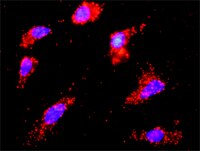ST1640 Anti-CSNK1E Mouse mAb (2E1)
Recommended Products
Overview
| Replacement Information |
|---|
Key Specifications Table
| Host |
|---|
| M |
| References |
|---|
| Product Information | |
|---|---|
| Form | Liquid |
| Formulation | In PBS, pH 7.2. |
| Positive control | HeLa cells |
| Preservative | None |
| Applications | |
|---|---|
| Key Applications | Immunocytochemistry |
| Application Notes | Immunocytochemistry (1:50) |
| Application Comments | Variables associated with assay conditions will dictate the proper working dilution. |
| Biological Information | |
|---|---|
| Immunogen | A recombinant polypeptide corresponding to amino acids of 2-101 human CSNK1E, expressed as a GST fusion protein |
| Clone | 2E1 |
| Host | Mouse |
| Isotype | IgG2a |
| Physicochemical Information |
|---|
| Dimensions |
|---|
| Materials Information |
|---|
| Toxicological Information |
|---|
| Safety Information according to GHS |
|---|
| Safety Information |
|---|
| Product Usage Statements |
|---|
| Packaging Information |
|---|
| Transport Information |
|---|
| Supplemental Information |
|---|
| Specifications |
|---|
| Global Trade Item Number | |
|---|---|
| Catalog Number | GTIN |
| ST1640 | 0 |








